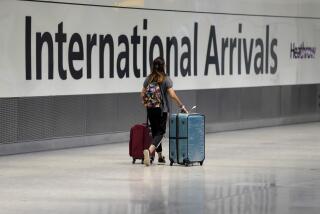U.S. travel advisory about Iraq was the sore point for Maliki
- Share via
WASHINGTON — Iraq and the United States, at odds for decades over the gravest matters of war and peace, have a new point of conflict: a humble travel bulletin.
During Iraqi Prime Minister Nouri Maliki’s recent visit to Washington, Iraqi officials complained to senior U.S. officials that the State Department’s advisory for American travelers was painting too dark a picture of Iraq and scaring away U.S. investment, Samir Shakir Mahmoud Sumaidy, Iraq’s ambassador to the U.S., told reporters Friday.
Germany and Japan have revised their evaluations of Iraq to reflect improvements in security, he said. But the handout from the State Department’s consular office still warns against “all but essential travel.”
The result, Sumaidy said, is that at a time when investment from Germany, Japan, China, France and other industrialized countries is rising, such a warning “puts American business at a disadvantage.”
He said many parts of Iraq were safe, and that the Kurdistan region, in the north, was “no less secure than Washington, D.C.” He also said the reason investors from the world’s largest economy have been holding back is “primarily this perception of violence.”
The issue is key at the moment for the Iraqi government, which would like to see fewer American troops, but more U.S. investors. Maliki’s trip was essentially a plea for the United States to maintain its economic and diplomatic commitment to Iraq, even while the military presence dwindles.
Sumaidy said the growth of investment from such countries as Germany, France and China meant that, ironically, the nations that resisted joining the United States in its 2003 invasion of Iraq were “positioning themselves to be the greatest beneficiaries” of the outcome.
The travel bulletin says that although there have been security improvements, Iraq “remains dangerous and unpredictable.” It warns of terrorist, criminal and sectarian attacks and kidnappings, and says that even in safer northern Iraq conditions “could deteriorate quickly.”
Secretary of State Hillary Rodham Clinton promised that “she would look into” the matter, Sumaidy said.
--
More to Read
Sign up for The Wild
We’ll help you find the best places to hike, bike and run, as well as the perfect silent spots for meditation and yoga.
You may occasionally receive promotional content from the Los Angeles Times.







